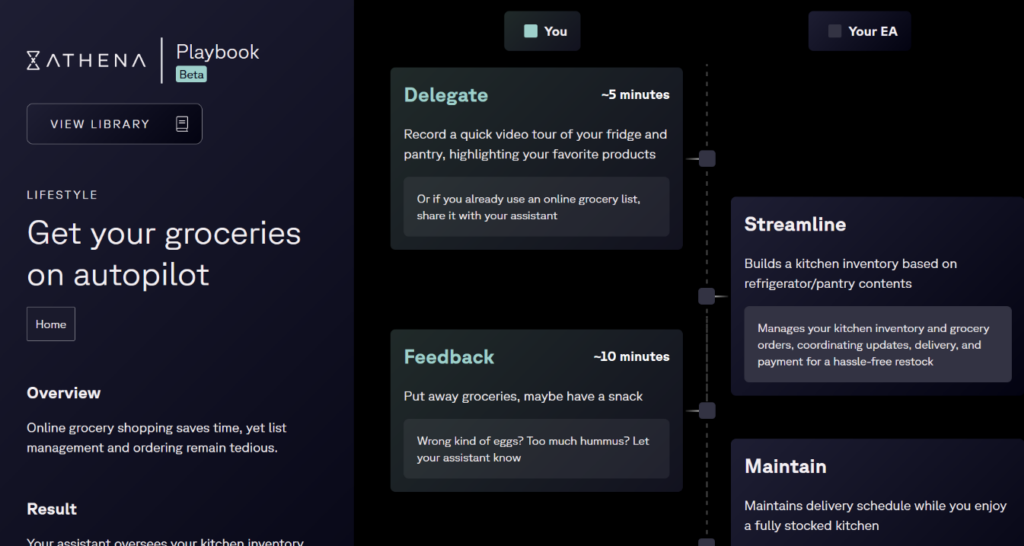You may recall last year we published an in-depth report on investing in The Philippines.
Today, we’re looking at a service business that connects Philippines-based admin professionals with busy executives and entrepreneurs.
In this short issue, we explore how admin work has changed, why the pendulum swung away from admin assistants, and why companies should consider swinging it back.
You’ll learn:
- Why did companies ditch admin assistants?
- Why are assistants undervalued?
- What does Athena do?
- Why is the timing right for Athena’s model?
- How do Athena’s assistants compare to AI?
Note: This issue is sponsored by our friends at Athena. As always, we think you’ll find it informative and fair.
Let’s go 👇
Table of Contents
Where did all the assistants go?
In your head, picture what a “modern” office looks like.
Chances are you visualized an open floor plan, plenty of natural light, and…not many secretaries.
That’s a sharp contrast from offices in the 50s and 60s, when every mid-level executive had their own personal secretary.
Mad Men wasn’t lying to you, they were everywhere.

But times have changed, in more ways than one. The term “secretary” has long since been replaced by “executive assistant” or “administrative assistant.”
Of course, it’s not like secretarial tasks have disappeared. Admin work still needs to be done today.
So where did all these assistant jobs go?
Office workers became their own assistants
The answer is kind of depressing. Admin roles didn’t really disappear, they just got redistributed back to the workforce.
Businesses have shifted to a self-service model, where even many well-paid executives are expected to make their own travel arrangements, sort out expenses, and manage their calendars.
For modern knowledge workers, it might be hard to appreciate that dedicated professionals once completed all these tasks.
Facing pressure to cut costs in the 80s and 90s, companies saw support staff like admin assistants as an easy target to reduce headcount — especially when individual workers could handle those tasks themselves.
The trend towards reducing support staff has continued into the 21st century. Government projections indicate that total admin assistant employment in the US will decline by 10% over the next decade.

Although slashing admin staff is an easy short-term profit booster, it’s not an ideal long-term situation.
And this isn’t a matter of knowledge workers being “too good” to do certain work. It’s about the profound economic consequences of how employees spend their time.
No assistants, no efficiency
One core tenet in economics is that people should specialize in the job that they’re best at.
This sounds like common sense, but it’s easy to fall into the trap of “just doing easy stuff yourself,” because it’s easy.
For example, a doctor may want to save money by filling out routine paperwork themselves rather than paying someone else to do it.
Sounds logical, but in reality, any time spent doing paperwork is time spent not providing medical services.
And since a doctor can earn much more money providing medical services than doing paperwork, they can maximize their revenue by hiring someone else instead of wasting time doing both roles.
In economics, this idea is known as comparative advantage. And it’s the main reason why assistants are undervalued in the workplace.
Just because a high-value professional can spend their time doing lower-value tasks, it doesn’t mean they should.
Suppose an executive earns $10,000/week, working an average of 50 hours. If that executive spends even one hour per week making travel arrangements, the company is effectively paying someone $200/hour to book flights and hotels.
Not exactly an efficient use of cash.

Aside from economic consequences, there are also personal consequences here. Busy knowledge workers can’t spend as much time with their friends and families, and administrative pros have a tougher time finding work.
But today, the tide is starting to change. Slowly but surely, people are beginning to recognize (and remember) the tremendous value an assistant can unlock.
Finding an assistant that’s effective, personable, human, and of course reliable is quite a challenge.
This is where a company like Athena steps in.
Athena: The power of an elite assistant
Athena is helping to reverse the multi-decade trend away from administrative support by connecting world-class professionals with high-skilled full-time elite assistants.
One phrase on Athena’s website highlights the firm’s value proposition, succinctly capturing the idea underlying the entire self-service model and why it just doesn’t make economic sense:
“If you don’t have an assistant, you are the assistant.”
Athena takes the assistant model a step further than the secretaries of the 80s. Athena elite assistants work on both personal and business tasks.
Yes, to some degree this has always been the case. But it especially makes sense today, when the line between work and play is fuzzier than ever.
By assisting in life, rather than just work, elite assistants can free up your time in a way that standard admin assistants cannot.
Being able to effectively handle a broad variety of tasks obviously isn’t easy. Lots of people can do admin tasks, very few can do them well.
One of the most challenging parts of working with an assistant has historically been finding someone up to the task.
Recognizing this challenge, Athena has a strict vetting system. Fewer than 1% of applicants are accepted to be elite assistants.

Once accepted, assistants go through 4 weeks of training, and receive continuous mentorship and guidance.
Athena’s services don’t stop at connecting you with an assistant — they show you how to work with them through task delegation.
The art of delegation
Having an assistant is half the battle. To get true value from working with an assistant, you need to know how to leverage them.
Athena has dedicated substantial resources into this idea. They’re trying to inspire you to see how an assistant will make your life easier.
Their Playbook Library includes an assortment of guides and examples of tasks that an elite assistant can handle, including:
- Buying your groceries
- Planning an entire family vacation
- Rebuilding your personal calendar to live more intentionally
- Recruiting the best candidates for positions at your firm
- Booking a table at exclusive restaurants

What about AI?
AI gets all the hype, and some people think that AI assistants are good enough to serve as their dedicated admin pros.
And sometimes that may be true! AI is often good enough for low-value tasks like writing generic follow-up emails or transcribing meetings.
But truly elite assistants offer much more than AI:
- Demonstrating emotional intelligence when making calls
- Navigating nuanced topics where AI decision-making falls flat
- Learning and adapting to your clients’ needs (just like a real person!)
And it’s not like Athena and AI are mutually exclusive. Far from it.
AI shines in helping Athena’s assistants be far more efficient with their time. They incorporate AI tools into their workflow. Every Athena assistant utilizes it at least once a month.
In other words, AI isn’t ready to be an elite assistant yet.
But with Athena, you get the best of both worlds, merging human talent with the productivity improvements of AI.
What’s the cost?
For a full-time Athena assistant who works in your time zone, you’ll pay $3,000/month.
Now, spending $36k a year to save some time doesn’t make sense for everyone. But for high-value professionals who can afford this, an Athena assistant will almost certainly pay for themselves in terms of time saved.
On top of a dedicated assistant who works 40 hours a week, you get access to a network of world-class peers who also recognize the value of their time. Folks who work at OpenAI, Stripe, Sequoia Capital, etc.
Ready to 10x your leverage?
Good news: Alts readers like you get a $1,500 credit.
Disclosures from Alts
- This issue was sponsored by Athena
- Alts.co’s leadership team does not yet utilize Athena assistants (but they desperately need to!)
- The ALTS 1 Fund holds no interest in any companies mentioned in this issue.
- This issue contains no affiliate links
This issue is a sponsored deep dive, meaning Alts has been paid to write an independent analysis of Athena and their associated markets. Athena has agreed to offer an unconstrained look at its business, offerings, and operations. Athena is also a sponsor of Alts, but our research is neutral and unbiased. This should not be considered financial, legal, tax, or investment advice, but rather an independent analysis to help readers make their own investment decisions. All opinions expressed here are ours, and ours alone. We hope you find it informative and fair.












